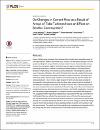HIGHER EDUCATION STUDENT'S INTENTION AND PRO-ENVIRONMENTAL BEHAVIOR GAP, THE ROLE OF UNIVERSITY PRACTICES, SOCIOCULTURAL FACTORS, AND INDIVIDUAL NORMS
الملخص
The significance of research on students' environmental behavior has grown in response to serious environmental concerns. Nevertheless, there is still a gap in comprehension because sustainable environmental intentions frequently do not manifest as factual behavior. This research aims to explore how sociocultural factors and personal norms affect students' pro-environmental behavior. Additionally, we seek to assess the role of university practices in bridging the gap between intention and actual green behavior. Our primary emphasis is to elucidate how these elements interact to predict pro-environmental behavior across university students, offering insight into effective strategies to prompt environmentally friendly actions and to contribute to cultivating environmentally conscious future generations. We deployed a hypothesis-driven, deductive confirmatory approach, using a quantitative cross-sectional data-gathering technique, based on a random selection of a large sample. 641 responses were collected through an online questionnaire and its hard copy version and validated for analysis. The analysis highlights the significant influence of behavioral intention on pro-environmental behavior. Although the moderation impact of ability, motivation, and opportunity differs, motivation and opportunity are distinguished as key variables that determine the translation of intention into positive and actual environmental conduct. The substantially significant conceptual model's explanatory and predictive power provide useful practical insights for researchers and professionals in anticipating and stimulating pro-environmental behavior. By challenging established assumptions and emphasizing the significance of motivation and personal agency, the current research advances our understanding of university students' pro-environmental behavior. Optimum results could be achieved by integrating personal norms into learning activities, awareness campaigns, and the development of supportive policies. Prospective research might emphasize various demographic categories for a more thorough understanding of the sociocultural effects on pro-environmental behavior. Employing objective measurements may further enhance the accuracy of findings, and longitudinal research has great potential in tracking the evolving dynamics between behavioral intention and pro-environmental behavior, enabling the implementation of highly effective interventions.
DOI/handle
http://hdl.handle.net/10576/51146المجموعات
- Business Administration [111 items ]
وثائق ذات صلة
عرض الوثائق المتصلة بواسطة: العنوان، المؤلف، المنشئ والموضوع.
-
QU programmes get international accreditation
( Dar Al Sharq Group , 2012 , Article) -
Environmentally powered multiparametric wireless sensor node for air quality diagnostic
Touati F.; Legena C.; Galli A.; Crescini D.; Crescini P.; Ben Mnaouer A.... more authors ... less authors ( M Y U Scientific Publishing Division , 2015 , Article)Sensor networks dedicated to environmental monitoring have helped in the analysis of primal processes and have also provided vital hazard early warnings. At the same time, environmental energy is now becoming a popular ... -
Do changes in current flow as a result of arrays of tidal turbines have an effect on benthic communities?
Kregting, Louise; Elsaesser, Bjoern; Kennedy, Robert; Smyth, David; O'Carroll, Jack; Savidge, Graham... more authors ... less authors ( Public Library of Science , 2016 , Article)Arrays of tidal energy converters have the potential to provide clean renewable energy for future generations. Benthic communities may, however, be affected by changes in current speeds resulting from arrays of tidal ...




